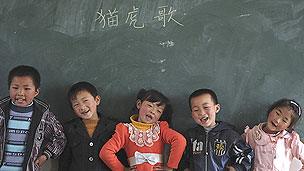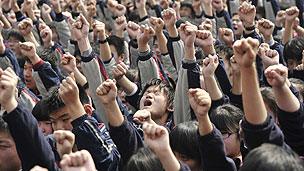China: The world's cleverest country?
- Published

This is the most extensive insight into how China's school standards compare with other countries
China's results in international education tests - which have never been published - are "remarkable", says Andreas Schleicher, responsible for the highly-influential Pisa tests.
These tests, held every three years by the Organisation for Economic Co-operation and Development, measure pupils' skills in reading, numeracy and science.
Pisa tests - the Programme for International Student Assessment - have become the leading international benchmark.
The findings indicate that China has an education system that is overtaking many Western countries.
While there has been intense interest in China's economic and political development, this provides the most significant insight into how it is teaching the next generation.
'Incredible resilience'
The Pisa 2009 tests showed that Shanghai was top of the international education rankings.
But it was unclear whether Shanghai and another chart-topper, Hong Kong, were unrepresentative regional showcases.

The OECD's Andreas Schleicher: "Fairness and relevance are not the same thing"
Mr Schleicher says the unpublished results reveal that pupils in other parts of China are also performing strongly.
"Even in rural areas and in disadvantaged environments, you see a remarkable performance."
In particular, he said the test results showed the "resilience" of pupils to succeed despite tough backgrounds - and the "high levels of equity" between rich and poor pupils.
"Shanghai is an exceptional case - and the results there are close to what I expected. But what surprised me more were the results from poor provinces that came out really well. The levels of resilience are just incredible.
"In China, the idea is so deeply rooted that education is the key to mobility and success."
Investing in the future
The results for disadvantaged pupils would be the envy of any Western country, he says.
Mr Schleicher is confident of the robustness of this outline view of China's education standards.
In an attempt to get a representative picture, tests were taken in nine provinces, including poor, middle-income and wealthier regions.

High school students shout slogans such as "I must go to college" in a pre-exam event in Nanjing
The Chinese government has so far not allowed the OECD to publish the actual data.
But Mr Schleicher says the results reveal a picture of a society investing individually and collectively in education.
On a recent trip to a poor province in China, he says he saw that schools were often the most impressive buildings.
He says in the West, it is more likely to be a shopping centre.
"You get an image of a society that is investing in its future, rather than in current consumption."
There were also major cultural differences when teenagers were asked about why people succeeded at school.
"North Americans tell you typically it's all luck. 'I'm born talented in mathematics, or I'm born less talented so I'll study something else.'
"In Europe, it's all about social heritage: 'My father was a plumber so I'm going to be a plumber'.
"In China, more than nine out of 10 children tell you: 'It depends on the effort I invest and I can succeed if I study hard.'
"They take on responsibility. They can overcome obstacles and say 'I'm the owner of my own success', rather than blaming it on the system."
Education's World Cup
This year will see another round of Pisa tests - it's like World Cup year for international education. And Mr Schleicher's tips for the next fast-improving countries are Brazil, Turkey and Poland.
Mr Schleicher, a German based in the OECD's Paris headquarters, has become the godfather of such global education comparisons.
Armed with a spreadsheet and an impeccably polite manner, his opinions receive close attention in the world's education departments.
The White House responded to the last Pisa results with President Barack Obama's observation that the nation which "out-educates us today will out-compete us tomorrow".
The next round of global league tables will test 500,000 pupils in more than 70 countries - with the results to be published late next year.
Education ministers will be looking nervously at the outcome.
"In the past, politicians could always say we're doing better than last year - everyone could be a success," he says, describing the tendency for national results to rise each year.
The arrival of Pisa tests sent an icy draught through these insulated corridors.
No excuses
Perhaps the biggest discomfort of all was for Germany - where "Pisa shock" described the discovery that their much vaunted education system was distinctly average.

Finland was the education world leader in rankings a decade ago
And the biggest change in attitude, he says, has been the United States - once with no interest in looking abroad, now enthusiastically borrowing ideas from other countries.
"Education is a field dominated by beliefs and traditions, it's inward looking. As a system you can find all kinds of excuses and explanations for not succeeding.
"The idea of Pisa was to take away all the excuses.
"People say you can only improve an education system over 25 years - but look at Poland and Singapore, which have improved in a very short time, we've seen dramatic changes."
The biggest lesson of the Pisa tests, he says, is showing there is nothing inevitable about how schools perform.
"Poverty is no longer destiny. You can see this at the level of economies, such as South Korea, Singapore."
Fair comparison?
A criticism of such rankings has been that it is unfair. How can an impoverished developing country be compared with the stockpiled multiple advantages of a wealthy Scandinavian nation?
Here Mr Schleicher makes a significant distinction. It might not be fair, but such comparisons are extremely relevant. "Relevance and fairness are not the same thing," he says.

South Korea is identified by the OECD as an example how education can drive economic growth
Youngsters in the poorest countries are still competing in a global economy. "It's a terrible thing to take away the global perspective."
He also attacks the idea of accepting lower expectations for poorer children - saying this was the "big trap in the 1970s".
"It was giving the disadvantaged child an excuse - you come from a poor background, so we'll lower the horizon for you, we'll make it easier.
"But that child has still got to compete in a national labour market.
"This concept of 'fairness' is deeply unfair - because by making life easier for children from difficult circumstances, we lower their life chances."
'Sorting mechanism'
So why are the rising stars in Asia proving so successful?
Mr Schleicher says it's a philosophical difference - expecting all pupils to make the grade, rather than a "sorting mechanism" to find a chosen few.
He says anyone can create an education system where a few at the top succeed, the real challenge is to push through the entire cohort.
In China, he says this means using the best teachers in the toughest schools.
The shifting in the balance of power will be measured again with Pisa 2012, with pupils sitting tests from Stockholm to Seoul, London to Los Angeles, Ankara to Adelaide.
"I don't think of Pisa as being about ranking, it tells you what's possible. How well could we be doing?"
- Published22 September 2015